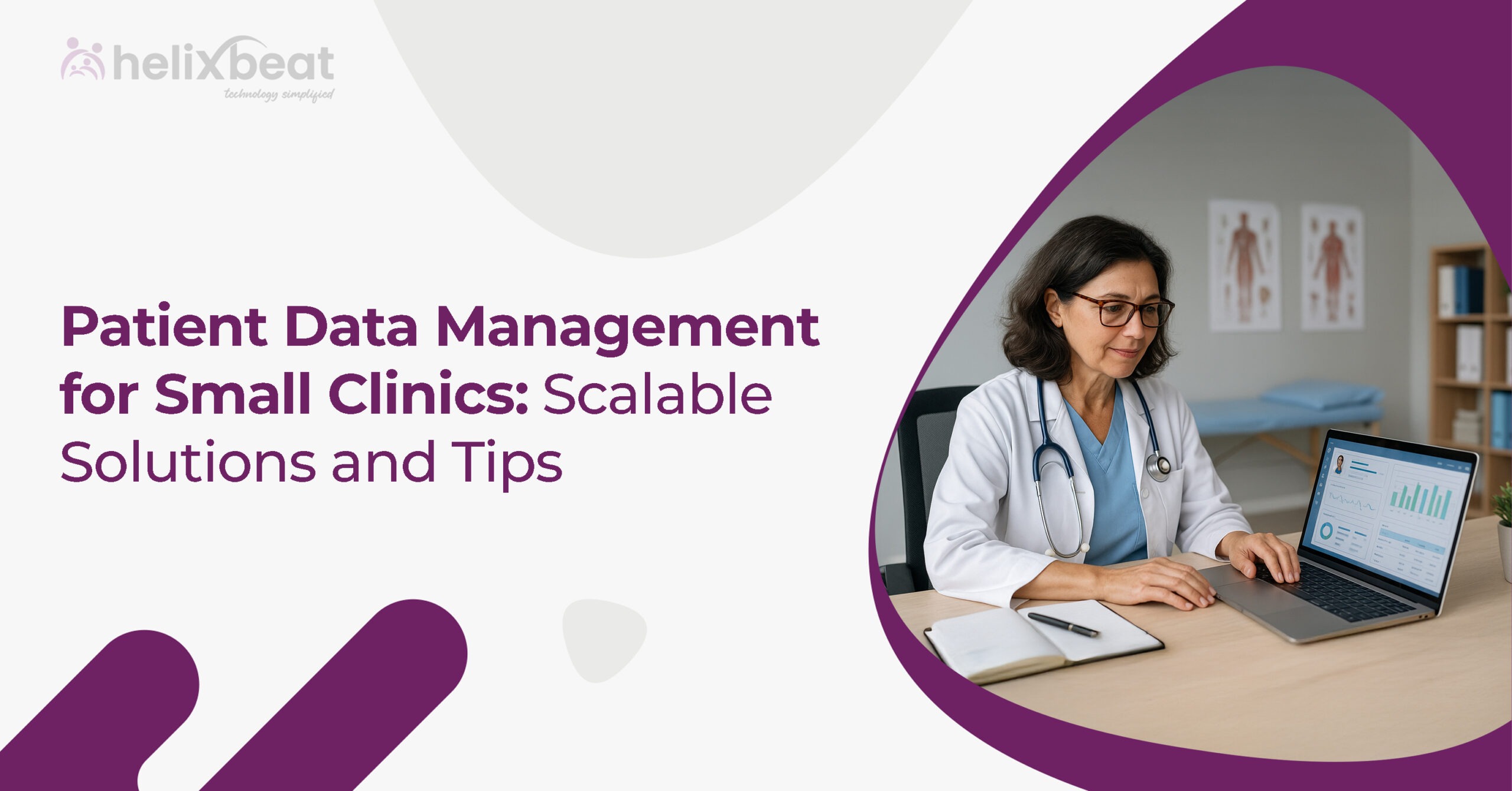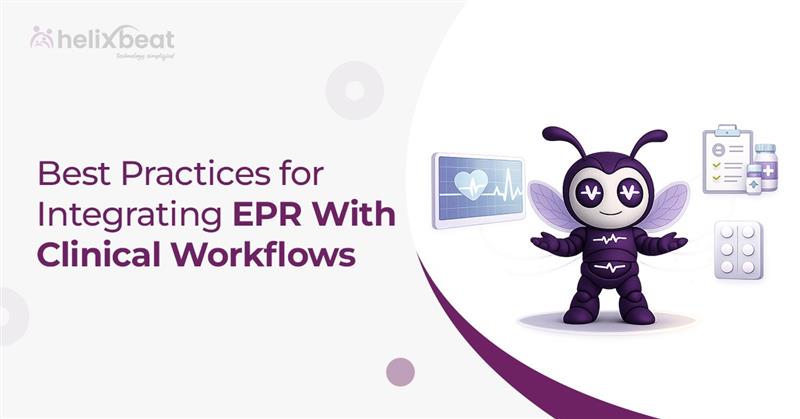“Accurate and accessible patient data is the foundation of quality healthcare—without it, even the best clinicians can struggle to deliver effective care.”
— Dr. Anjali Mehta, Healthcare Technology Specialist
Patient Data Management involves systematically gathering, storing, and managing health information about patients securely and efficiently. This encompasses medical histories, treatment records, laboratory results, billing data, and scheduling appointments, all of which are essential for high-quality healthcare.

Table of Contents
Understanding Healthcare Data Management Systems
What if there was a way for healthcare providers to access all patient information instantly, securely, and accurately whenever they needed it?
A Healthcare Data Management System is a comprehensive platform designed to collect, store, organize, and safeguard patient information along with other critical healthcare data. This system enables healthcare providers, from small clinics to large hospitals, to efficiently manage sensitive data accurately and easily.
These systems are crucial in improving patient care outcomes by providing medical professionals with timely access to up-to-date patient records and clinical data.
As patient information becomes more complex and regulatory requirements such as HIPAA, healthcare data management systems help clinics and organizations maintain full compliance. Additionally, they promote smooth data interoperability, allowing seamless sharing and updating of patient information across various healthcare applications, departments, and locations making coordinated care a reality.
Looking for a powerful, scalable solution to simplify your patient data management? Discover how Helixbeat PULSE can help your clinic securely manage patient data with ease and full compliance.
Why Clinic Management Software is Essential for Small Clinics
Small clinics face specific challenges like limited resources and a growing volume of patient data. Clinic management software streamlines patient records, scheduling, billing, and reporting, reducing paperwork and errors.
This digital shift allows clinics to operate more efficiently, enabling providers to focus on quality care. Additionally, such software supports regulatory compliance and data security, essential for protecting patient information and avoiding legal issues. With complete digital records, doctors can quickly review medical histories, allergies, lab results, and treatment plans, enabling informed clinical decisions.
Here’s how Clinic Management Software Enhances Patient Care:
- Provides healthcare providers with timely and accurate access to patient information.
- Offers complete digital records for quick review of medical histories, allergies, lab results, and treatment plans.
- Enables informed clinical decisions based on comprehensive patient data.
- Efficient appointment scheduling reduces patient wait times and prevents overcrowding.
- Creates a more comfortable and organized experience for patients.
- Includes automated follow-up reminders to keep patients engaged in their care.
- Supports telehealth integration for remote consultations and care delivery.
- Provides patient portals that improve communication between patients and providers.
- It helps track treatment outcomes and identify gaps in patient care.
- Supports continuous improvement and personalized management of patient health.
Qualities to Look for in the Best Clinic Management Software
The best software solutions combine essential features, strong security measures, and the flexibility to grow alongside your practice.
1. Essential Features for Effective Patient Data Solutions
- Comprehensive patient data management, including appointment scheduling, electronic health records (EHR), billing, and automated reminders.
- Integration capabilities with labs, pharmacies, and insurance providers for smooth data flow.
- User-friendly interfaces that minimize training time and improve staff productivity.
- Reporting and analytics tools to track patient outcomes, financial performance, and operational efficiency.
2. Security and Compliance Requirements
- Compliance with healthcare regulations like HIPAA to protect patient data
- Encryption of data both at rest and during transmission.
- Role-based access control to restrict data access to authorized users.
- Audit trails for tracking access and modifications to records.
- Automatic data backups and secure cloud storage to prevent data loss.
Example: Helixbeat PULSE offers a healthcare data management system built with these strict security standards to simplify compliance.
3. Scalability and Multi-Clinic Location Handling
- Ability to scale smoothly by adding new users, departments, or branches without performance issues.
- Centralized database accessible across multiple clinic locations.
- Consolidated reporting and unified patient records across sites.
- Synchronized appointment systems to maintain consistent patient care.
- Supports business growth without needing a complete software overhaul, saving time and costs.
Benefits of Effective Healthcare Data Management
1. Improved Patient Outcomes and Care Coordination
- Accurate and accessible patient information allows healthcare providers to make timely and informed decisions.
- This reduces delays, prevents duplicate tests, and ensures personalized care.
- Platforms like Helixbeat PULSE integrate patient data sources to facilitate smooth communication among care teams.
2. Streamlined Administrative Tasks and Reduced Errors
- Scheduling, billing, and documentation automation minimizes manual paperwork and human errors.
- This frees up staff time to focus more on patient care and improves the accuracy of patient records, which is essential for compliance and billing.
3. Enhanced Data Accessibility and Reporting Capabilities
- Easy access to real-time data supports strategic planning and quality improvements.
- Advanced reporting and analytics tools help clinics track patient trends, monitor outcomes, and generate detailed reports.
- Helixbeat PULSE enables data-driven decisions by providing actionable insights for better healthcare delivery.
4. Supports Clinic Growth and Patient Satisfaction
- Effective data management lays the foundation for sustained growth and higher patient satisfaction in small clinics by strengthening clinical workflows and operational efficiency.
Common Challenges in Healthcare Data Management
Below are some key obstacles:
1. Data Security and Privacy Concerns
- The primary concern in healthcare data management is safeguarding sensitive patient information.
- With cyber threats on the rise, small clinics must adopt robust data protection measures.
- This includes encrypting data during transmission, securing databases, and implementing strong access controls to ensure only authorized personnel can access confidential data.
- Compliance with regulations such as HIPAA is also crucial in protecting patient privacy.
2. Managing Multiple Data Sources and Formats
- Healthcare data is often fragmented from various sources, such as patient records, lab results, appointment histories, and insurance claims.
- These data sources may exist in different formats, making integrating them into a single, unified system difficult.
- Clinics must invest in solutions that consolidate and standardize data from disparate systems, providing a comprehensive view of each patient’s history.
- An advanced healthcare data management system supporting multiple data types can streamline this process.
3. Ensuring Compliance with Healthcare Regulations
- Healthcare providers must follow strict data management regulations to protect patient information and maintain trust.
- Regulations like HIPAA and local data privacy laws mandate secure storage, transmission, and access controls for healthcare data. Staying compliant for small clinics can be challenging without the right tools.
- Healthcare data management systems that comply with these regulations can help clinics avoid fines and legal issues.
- Regular audits and updates to software systems are necessary to stay ahead of evolving legal requirements.
CTA: Learn how Helixbeat’s healthcare data management solutions can help you navigate these challenges and improve your clinic’s data management practices.
Scalable Patient Data Solutions for Growing Small Clinics
1. Integrating ERP and Clinic Management Systems
- Combining Enterprise Resource Planning (ERP) with clinic management software creates a unified platform that streamlines operations across finance, inventory, appointments, and patient records.
- This integration eliminates data silos, reduces manual errors, and enhances workflow efficiency, allowing clinics to focus more on patient care.
2. Handling Multi-Location Clinics with Clinic Management ERP Software
- For clinics operating across multiple locations, managing patient data centrally is critical.
- Clinic management ERP software by Helixbeat enables seamless synchronization of data across sites, ensuring that patient records are up-to-date, consistent, and accessible to authorized personnel anywhere.
- This multi-location support improves coordination, billing accuracy, and compliance management across the network.
3. Future-Proofing Your Patient Data Management Strategy
- Planning for future growth means choosing scalable solutions that adapt to evolving technology and regulatory requirements.
- Investing in flexible software architecture, cloud-based storage, and regular system upgrades helps clinics stay ahead of changes in healthcare standards and patient expectations.
- Building a future-proof data management system protects your clinic’s investment and supports sustainable expansion.
Wrapping Up
Patient data management is rapidly evolving, and small clinics must adopt scalable, secure, and customizable solutions to enhance efficiency and patient care. Clinics should prioritize healthcare data management systems tailored to their needs while ensuring compliance with regulations like HIPAA to protect patient privacy. It’s essential to choose software that integrates well with existing tools, supports cloud storage for flexibility and backup, and provides adequate staff training.
Helixbeat’s patient data management software addresses the challenges of small clinics. With customizable features, real-time data access, multi-location support, and strong security, Helixbeat helps clinics streamline workflows and improve care quality. Our platform adapts as your practice grows, simplifying compliance and enhancing data accessibility. Are you ready to discover a more innovative approach to managing patient data?
FAQs
- What is Patient Data Management Software?
It is a digital tool that helps clinics securely store, organize, and manage patient records and healthcare information efficiently.
- Can Clinic Management Software Improve Patient Care?
Yes, by streamlining workflows, reducing errors, and enabling quick access to patient data, it supports better clinical decisions and patient outcomes.
- Is it Possible to Customize Clinic Management Software?
Absolutely. Most clinic management software can be tailored to fit specific business needs, workflows, and scale as the clinic grows.
- How Does Healthcare Data Management Ensure Compliance?
It incorporates security protocols and audit trails that align with regulations like HIPAA to protect patient privacy and data integrity.
- Can ERP Software Manage Multiple Clinic Locations?
Yes, ERP systems are designed to handle data and operations across multiple sites, providing centralized control and reporting.














